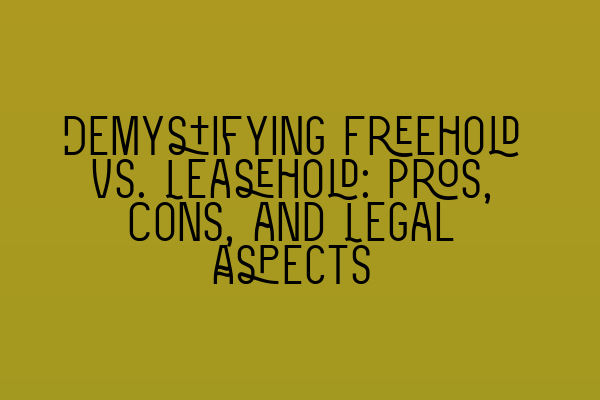Demystifying Freehold vs. Leasehold: Pros, Cons, and Legal Aspects
When it comes to property ownership, there are two main types: freehold and leasehold. Understanding the difference between these types is crucial for anyone looking to buy, sell, or invest in property. In this article, we will demystify the concepts of freehold and leasehold, exploring their pros, cons, and legal aspects.
Freehold Property
Freehold property, also known as fee simple, represents absolute ownership of the property and the land it sits on. When you buy a freehold property, you become the outright owner, with the right to use, occupy, and dispose of the property as you wish. Freehold ownership gives you full control and freedom over the property without any time restrictions.
One of the key advantages of freehold ownership is the absence of ground rent. Unlike leasehold properties, freehold properties do not require the payment of ongoing ground rent to the landlord. This means you are not tied to any financial obligations towards a landlord, offering greater financial freedom in the long run.
Furthermore, freehold properties generally hold their value better than leasehold properties. As the absolute owner, you have more control over maintenance and development, which can positively impact the property’s marketability and resale potential.
However, freehold ownership also comes with responsibilities. As the owner, you are solely responsible for the maintenance, repairs, and insurance of the property. Any costs incurred are solely your responsibility, and you cannot rely on a landlord to cover these expenses.
Misrepresentation in Contracts: Unveiling Deceptive Practices
A Closer Look at SQE Contract Law Syllabus
Leasehold Property
Leasehold property, on the other hand, grants you the right to occupy and use the property for a fixed period of time, as stipulated in the lease agreement. Unlike freehold ownership, leasehold ownership is temporary and subject to the terms and conditions set out in the lease agreement.
Leasehold ownership is commonly associated with flats and apartments, where multiple units are owned within a larger building or complex. In these cases, the leaseholder shares the responsibility of maintaining common areas and usually pays service charges towards the upkeep and management of the property.
One advantage of leasehold ownership is that it often offers access to communal facilities such as gardens, gyms, or parking spaces. Additionally, leasehold properties typically have lower upfront costs compared to freehold properties, making them more affordable for first-time buyers.
However, leasehold ownership also has its drawbacks. One major concern is the length of the lease. As the lease term diminishes, the value of the property may decrease, making it harder to sell or secure mortgage financing. Additionally, leasehold properties are subject to ground rent, which is the annual rent payable to the landlord. Ground rent can increase over time, potentially posing a financial burden.
SQE Contract Law: Analyzing Landmark Cases and Influential Judicial Decisions
Understanding Contractual Capacity: Rights and Limitations
Legal Aspects
From a legal perspective, both freehold and leasehold properties come with certain rights and obligations. Freehold owners have the right to make alterations and improvements to the property without seeking permission from anyone, as long as they comply with planning regulations and any relevant restrictions in title deeds.
Leasehold owners, however, may need to seek permission from the landlord or the management company for alterations, renovations, or extensions. The lease agreement often prescribes the conditions under which such changes can be made. It is important to carefully review and understand the lease agreement to avoid any potential conflicts or violations.
Leasehold properties are also subject to ground rent, as mentioned earlier. The lease agreement will specify the amount and timing of ground rent payments. It is essential to be aware of these obligations and budget for them accordingly.
Interactive SQE Mock Tests for Contract Law: Test Your Knowledge
In conclusion, understanding the differences between freehold and leasehold properties is crucial for informed property ownership decisions. While freehold ownership offers greater control and no ongoing financial obligations, leasehold ownership provides access to shared facilities and affordability benefits.
Whether you are considering buying, selling, or investing in property, it is essential to seek professional legal advice to ensure you fully understand the rights, responsibilities, and legal aspects associated with your chosen type of property ownership.
